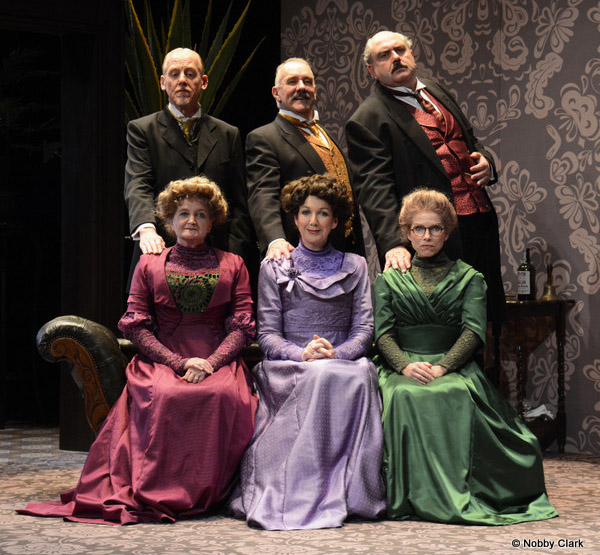
Although When We Are Married was stock in trade to the rep companies of the 1950s and 60s it was, during that time, rather poo-pooed and ignored by the theatre establishment. With the advent of John Osborne and the kitchen sink in 1956 it was unceremoniously and firmly relegated to the back burner, rarely seeing the light of day for the next four decades. It was considered far too bourgeois, much too old-fashioned and irrelevant. What its detractors failed to see was that it, along with most of Priestley’s other plays, said as much about British social mores, prejudices and conventions as Osborne ever did, it just set them in different eras – eras that ironically had much more social intolerance, class issues and deprivation than Osborne could ever imagine. Even the likes of Alan Sillitoe and John Braine, though writing about industrial life up north, had never, in reality, had it so good.
When We Are Married, like Priestley’s best known play, An Inspector Calls, deals with morality set within a warm and safe middle-class domestic environment. And while Inspector is a drama, melodrama even, When We Are Married is a comedy, and a very broad one at that.
Set in Edwardian times in the fictitious northern mill town of Clecklewyke, three respectable, bourgeois couples are jointly celebrating their silver wedding anniversaries. The weddings had taken place on t’ same day in t’ local chapel, an institution that figures largely in all their lives. The play opens, while the celebrations are taking place off-stage, with the young organist from t’ chapel being called to account by the three husbands. He has been seen billing and cooing in the town with a young lady and he is considered far too frivolous, not respectable enough and . . . well, young. But young Mr Forbes (deftly played by Luke Adamson) has made a discovery and has in his possession a letter that will severely rock and potentially sink their middle-class boat – it turns out the minister who conducted the ceremony was, in fact, not qualified to do so and consequently the three couples were not married at all and had been living in sin for the past twenty-five years. Well, you can imagine.
This play is every bit as good as any of the author’s other works and is beautifully written and observed. It has quite rightly been revived several times in the past twenty years consequent to Priestley’s reappraisal following the triumph of the National’s An Inspector Calls. When We Are Married examines social conventions and morals and tells us just as much about human relationships as later, so-called realist writers ever did and demonstrates that comedy can be as lethal a weapon as any brow-beating or heart-rending drama. In an ironic twist of fate it is Priestley who is now the go-to playwright and it is Osborne and his cronies who are considered old-fashioned. Plus ça change.
The cast were all excellent with Mark Stratton, Adrian Hood and Steve Huison convincing as the three upright and uptight husbands and Geraldine Fitzgerald, Sue Devaney and Kate Anthony all pitch perfect as their snooty spouses. I was less convinced by Barrie Rutter as the drunken local newspaper photographer who intrudes and adds his own fly to the already sticky ointment. Kat Rose-Martin, as the cheeky maid, nearly managed to up-stage everyone as did the other unruly domestic who didn’t know her place, Mrs Northrop, played by Lisa Howard.
So, all in all this is an excellent play, well produced, nicely performed and very funny. I really enjoyed it. ★★★★☆ Michael Hasted 2nd November 2016

